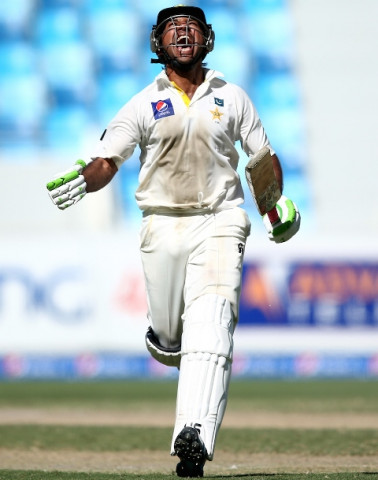Sarfraz’s story: Missing the father that said no
Wicketkeeper batsman ready to put his body on the line in World Cup

Diving around to field the tennis ball, Sarfraz would often end up bruised and dirty by the time the sun set. Before heading back home, he would brush his clothes clean so that his father, Shakeel Ahmed, does not see them and tell him off. PHOTO: AFP
The parents of Pakistan’s new star, Sarfraz Ahmed, were of the latter kind and the wicketkeeper had to time and again convince his parents to let him chase the distant dream of one day becoming an international player.
Memorising the Quran in a seminary as a young boy, Sarfraz could barely find time to play cricket as his school hours ran late into the afternoon. With hardly an hour to spare to dusk, young Sarfraz would ask the driver of his school van to drop him in front of the cricket ground near his school.
Here, at the Ghosul Azam, unknown to the world, Pakistan’s future wicketkeeper would throw his bag on a bench and captain his side, still in the brown shalwar kameez seminary uniform.
He started off as a fast-bowler in tape-ball cricket, as many in the country are wont to do. He then became a leg-spinner with the cricket ball, before donning on the gloves.
Diving around to field the tennis ball, Sarfraz would often end up bruised and dirty by the time the sun set. Before heading back home, he would brush his clothes clean so that his father, Shakeel Ahmed, does not see them and tell him off.
This continued till Sarfraz was selected for the U15 Zone VI team in Karachi. Once Shakeel started reading his son’s name in the newspapers, he stopped trying to prevent him from playing cricket but only if education remained the priority.
Sarfraz’s batting prowess in U15 and U17 cricket saw him scooped up by the Pakistan Cricket Club; the academy that also produced Asad Shafiq, Anwar Ali and Shaan Masood in recent years.
“In those early days, it was Moin Khan who inspired me due to his fighting attitude,” Sarfraz told The Express Tribune. “I took up wicketkeeping due to him and used to watch him and Rashid Latif.”
Sarfraz’s first big chance came when he tried out for the Pakistan U17s in 2004. Aamir Sohail was the selector but Sarfraz failed to catch his eye and did not make the cut. Once again, his father asked him to quit chasing an improbable dream and instead focus on his education.
But Sarfraz, known as Saifi by those close to him, was never one to give up.
With his determination, he forced his way into the Karachi U19s. By now his father had fallen sick and passed away soon after.
In his second year for Karachi U19s, Sarfraz scored 250 in just three matches and was involved in 15 dismissals, which prompted a call up from the Pakistan U19s. KESC soon came calling and seeing the character that had got him so far, appointed him captain ahead of several senior players.
When he represented Pakistan U19, he did so as captain as well, despite Nasir Jamshed having prior experience as skipper.
The wicketkeeper batsman was one of the standout performers for the U19 side in the Afro-Asia Cup and the home tour of West Indies. He then led Pakistan to U19 World Cup triumph in 2006 with a win over arch-rivals India; who had the likes of Rohit Sharma, Piyush Chawla, Ravindera Jadeja and Cheteshwar Pujara in their ranks.
Young Sarfraz was on top of the world but the absence of his father was all the more painful because of that.
“It is a painful reality that my father couldn’t see me play for Pakistan, not even when I captained Pakistan U19 and won the World Cup because of his illness,” he said. “If I could change one thing in my life, then this would be it. I am sure he would have been really proud of me to see me don the national colours.”
And so, within a year, Sarfraz had won the U19 World Cup, made his first-class debut and also his international bow with his first appearance coming against India.
But he could never break into the first team and for six years, between 2007 and 2013, he remained on the periphery.
That is, until 2014, when he emerged a genuine match-winner, both in Tests and limited overs cricket.
Now, he has his eyes set on the greatest prize in world cricket. “It can’t get bigger than this,” he said. “We have a chance of becoming heroes like Imran Khan’s 1992 team and Younus Khan’s 2009 World Twenty20 winning side.”
He became the first Pakistan wicketkeeper to score three Test tons in a calendar year and his 80-ball hundred against Australia was the second-fastest ever by a wicketkeeper. After the century, he ran in celebration with his white kit stained and dirty. As a kid, he used to wipe his clothes to hide the stains from his father; now he would give anything for him to see them.
Like Sports on Facebook, follow @ETribuneSports on Twitter to stay informed and join in the conversation.



















COMMENTS
Comments are moderated and generally will be posted if they are on-topic and not abusive.
For more information, please see our Comments FAQ